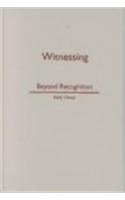Download Witnessing: beyond recognition PDF Free - Full Version
Download Witnessing: beyond recognition by Kelly Oliver in PDF format completely FREE. No registration required, no payment needed. Get instant access to this valuable resource on PDFdrive.to!
About Witnessing: beyond recognition
Philosophy A new, ethically based theory of identity by a major scholar. Challenging the fundamental tenet of the multicultural movement-that social struggles turning upon race, gender, and sexuality are struggles for recognition-this work offers a powerful critique of current conceptions of identity and subjectivity based on Hegelian notions of recognition. The author's critical engagement with major texts of contemporary philosophy prepares the way for a highly original conception of ethics based on witnessing. Central to this project is Oliver's contention that the demand for recognition is a symptom of the pathology of oppression that perpetuates subject-object and same-different hierarchies. While theorists across the disciplines of the humanities and social sciences focus their research on multiculturalism around the struggle for recognition, Oliver argues that the actual texts and survivors' accounts from the aftermath of the Holocaust and slavery are testimonials to a pathos that is "beyond recognition." Oliver traces many of the problems with the recognition model of subjective identity to a particular notion of vision presupposed in theories of recognition and misrecognition. Contesting the idea of an objectifying gaze, she reformulates vision as a loving look that facilitates connection rather than necessitates alienation. As an alternative, Oliver develops a theory of witnessing subjectivity. She suggests that the notion of witnessing, with its double meaning as either eyewitness or bearing witness to the unseen, is more promising than recognition for describing the onset and sustenance of subjectivity. Subjectivity is born out of and sustained by the process of witnessing-the possibility of address and response-which puts ethical obligations at its heart. Kelly Oliver is professor of philosophy and women's studies at SUNY Stony Brook. She is the author of, among other works, Subjectivity without Subjects (1998) and Family Values (1997).
Detailed Information
| Author: | Kelly Oliver |
|---|---|
| Publication Year: | 2001 |
| ISBN: | 9780816636280 |
| Pages: | 263 |
| Language: | English |
| File Size: | 18.274 |
| Format: | |
| Price: | FREE |
Safe & Secure Download - No registration required
Why Choose PDFdrive for Your Free Witnessing: beyond recognition Download?
- 100% Free: No hidden fees or subscriptions required for one book every day.
- No Registration: Immediate access is available without creating accounts for one book every day.
- Safe and Secure: Clean downloads without malware or viruses
- Multiple Formats: PDF, MOBI, Mpub,... optimized for all devices
- Educational Resource: Supporting knowledge sharing and learning
Frequently Asked Questions
Is it really free to download Witnessing: beyond recognition PDF?
Yes, on https://PDFdrive.to you can download Witnessing: beyond recognition by Kelly Oliver completely free. We don't require any payment, subscription, or registration to access this PDF file. For 3 books every day.
How can I read Witnessing: beyond recognition on my mobile device?
After downloading Witnessing: beyond recognition PDF, you can open it with any PDF reader app on your phone or tablet. We recommend using Adobe Acrobat Reader, Apple Books, or Google Play Books for the best reading experience.
Is this the full version of Witnessing: beyond recognition?
Yes, this is the complete PDF version of Witnessing: beyond recognition by Kelly Oliver. You will be able to read the entire content as in the printed version without missing any pages.
Is it legal to download Witnessing: beyond recognition PDF for free?
https://PDFdrive.to provides links to free educational resources available online. We do not store any files on our servers. Please be aware of copyright laws in your country before downloading.
The materials shared are intended for research, educational, and personal use in accordance with fair use principles.

